level+7常见动词时态变化表 空白
小学升初中复习-动词形态转换表

小学升初中复习-动词形态转换表现在时过去时现在分词(进行时)be 是-----------------------was, were-------------------being become 变成-----------------became----------------------becoming begin 开始------------------began-----------------------beginning blow 吹---------------------blew------------------------blowing break 断开------------------broke-----------------------breaking build 建筑------------------built-----------------------building buy 买----------------------bought----------------------buying can 能----------------------could-----------------------无catch 抓住------------------caught----------------------catching come 来---------------------came------------------------coming copy 拷贝-------------------copied----------------------copying cut 切----------------------cut-------------------------cutting do 做-----------------------did-------------------------doing draw 画---------------------drew------------------------drawing drink 喝--------------------drank-----------------------drinking drive 驾车------------------drove-----------------------driving eat 吃----------------------ate-------------------------eating fall 落下-------------------fell------------------------falling feed 喂---------------------fed-------------------------feeding feel 感觉-------------------felt------------------------feeling find 找寻-------------------found-----------------------findingfly飞----------------------flew------------------------flying forget 忘记-----------------forgot----------------------forgetting get 得到--------------------got-------------------------getting give 给予-------------------gave------------------------givinggo 去-----------------------went------------------------going grow 成长-------------------grew------------------------growing hang 挂---------------------hung------------------------hanging have 有---------------------had-------------------------having hear 听---------------------heard-----------------------hearing hold 拿住-------------------held------------------------holding hurt 伤害-------------------hurt------------------------hurting keep 保持-------------------kept------------------------keeping know 知道-------------------knew------------------------knowing learn 学习------------------learnt, learned-------------learning leave 离开------------------left------------------------leavinglet 让----------------------let-------------------------letting lose 丢失-------------------lost------------------------losing make 做---------------------made------------------------making may 可以--------------------might-----------------------无mean 意思-------------------meant-----------meaning meet 见面-------------------met-------------------------meeting must 必须-------------------must------------------------无put 放----------------------put-------------------------putting read 读---------------------read------------------------readingride 骑---------------------rode------------------------riding ring 响---------------------rang------------------------ringing run 跑----------------------ran-------------------------running say 说----------------------said------------------------saying see 看见--------------------saw-------------------------seeing sell 卖---------------------sold------------------------selling shall 将--------------------should----------------------无shoot 射击------------------shot------------------------shooting show 展示-------------------showed----------------------showing sing 唱歌-------------------sang------------------------singing sit 坐----------------------sat-------------------------sitting sleep 睡觉------------------slept-----------------------sleeping smell 闻--------------------smelt, smelled--------------smelling speak 讲话------------------spoke-----------------------speaking spell 拼写-------------------spelt, spelled-------------spelling spend 花钱------------------spent-----------------------spending stand 站立-------------------stood----------------------standing steal 偷窃------------------stole-----------------------stealing stick 粘贴------------------stuck-----------------------sticking sweep 打扫------------------swept-----------------------sweeping swim 游泳-------------------swam------------------------swimming swing 摆动------------------swung-----------------------swinging take 拿到-------------------took------------------------taking teach 教--------------------taught----------------------teachingtell 讲述-------------------told------------------------telling think 思考------------------tought---------------------thinking throw 投掷------------------threw-----------------------throwing wear 穿着-------------------wore------------------------wearing-- will 意愿-------------------would-----------------------无write 写--------------------wrote-----------------------writing。
(word完整版)初中英语动词时态归纳总结对照表,文档
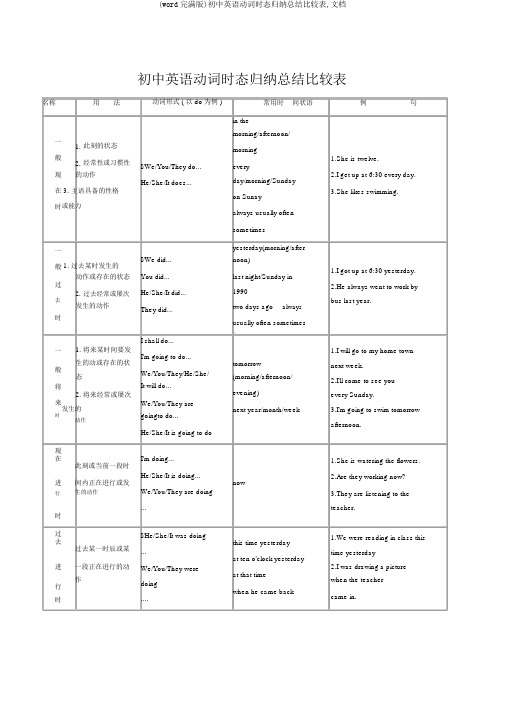
初中英语动词时态归纳总结比较表名称用法一1.此刻的状态般2.经常性或习惯性现的动作在3. 主语具备的性格时或能力一般1. 过去某时发生的动作或存在的状态过2.过去经常或屡次去发生的动作时一 1. 将来某时间要发生的动或存在的状般态将2. 将来经常或屡次来发生的时动作现在此刻或当前一段时进间内正在进行或发行生的动作时过去过去某一时辰或某进一段正在进行的动行作时动词形式 ( 以 do 为例 )I/We/You/They do...He/She/It does...I/We did...You did...He/She/It did...They did...I shall do...I'm going to do...We/You/They/He/She/It will do...We/You/They aregoingto do...He/She/It is going to doI'm doing...He/She/It is doing...We/You/They are doing...I/He/She/It was doing...We/You/They weredoing....常用时间状语in themorning/afternoon/morningeveryday/morning/Sundayon Sunayalways usually oftensometimesyesterday(morning/afternoon)last night/Sunday in1990two days ago alwaysusually often sometimestomorrow(morning/afternoon/evening)next year/month/weeknowthis time yesterdayat ten o'clock yesterdayat that timewhen he came back例句1.She is twelve.2.I get up at 6:30 every day.3.She likes swimming.1.I got up at 6:30 yesterday.2.He always went to work bybus last year.1.I will go to my home townnext week.2.I'll come to see youevery Sunday.3.I'm going to swim tomorrowafternoon.1.She is watering the flowers.2.Are they working now?3.They are listening to theteacher.1.We were reading in class thistime yesterday2.I was drawing a picturewhen the teachercame in.1.过去发生或已经现完成的某一动作对在此刻造成的影响或完结果成2. 表示过去已经开始并连续到此刻的时动作或状态过去过去某一时间前已完经发后的动作或状成态时现在此刻以前的一段时完间里素来进行的动成作 , 这个运作可能进仍在进行 , 也可能连续进行下去行时He/She/It has done...We/You/They havedone...I/We/You/He/She/Ithad done .I/We/You/They havebeen doing .He/She/It has beendoing .1.I've already posted thealready just before neletter.ver2.We have known each otherfor three yearsfor ten years.since 19903.They lived here since 1997.this morning4.Have you ever been tothese daysBeijing?1.I had learned 2000 words byby the end ofthe end of last term.when+一般过去时2.When I got out,the bus hadbefore+一般过去时already left.1.I have been skating for fivesince nine o’ clock hours.for five hours 2.She has been skating sincenine o’ clock..初中英语时态专项练习1、一般此刻时。
常见英语时态总结表
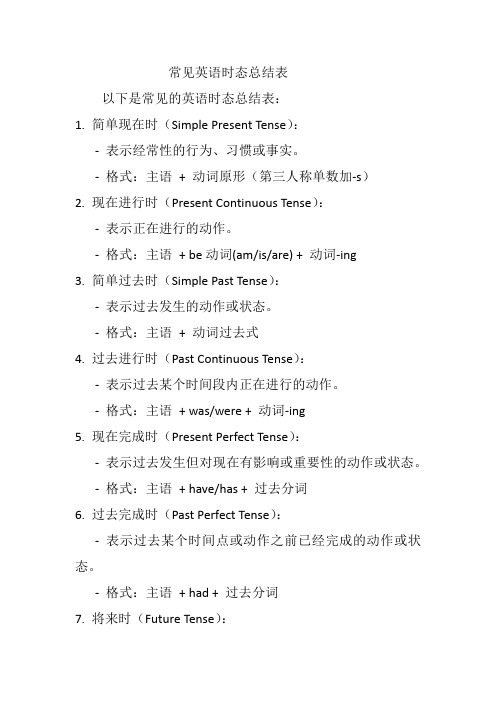
常见英语时态总结表以下是常见的英语时态总结表:1. 简单现在时(Simple Present Tense):- 表示经常性的行为、习惯或事实。
- 格式:主语+ 动词原形(第三人称单数加-s)2. 现在进行时(Present Continuous Tense):- 表示正在进行的动作。
- 格式:主语+ be动词(am/is/are) + 动词-ing3. 简单过去时(Simple Past Tense):- 表示过去发生的动作或状态。
- 格式:主语+ 动词过去式4. 过去进行时(Past Continuous Tense):- 表示过去某个时间段内正在进行的动作。
- 格式:主语+ was/were + 动词-ing5. 现在完成时(Present Perfect Tense):- 表示过去发生但对现在有影响或重要性的动作或状态。
- 格式:主语+ have/has + 过去分词6. 过去完成时(Past Perfect Tense):- 表示过去某个时间点或动作之前已经完成的动作或状态。
- 格式:主语+ had + 过去分词7. 将来时(Future Tense):- 表示将来要发生的动作或状态。
- 格式:主语+ will/shall + 动词原形8. 进行时态(Continuous Tenses):- 表示动作的持续性,与时间相关。
- 包括现在进行时、过去进行时和将来进行时。
9. 完成时态(Perfect Tenses):- 表示动作的完成性,与时间相关。
- 包括现在完成时、过去完成时和将来完成时。
这只是一个简单的总结,每个时态都有更多的应用和用法。
在实际使用中,需要注意时态的准确性和上下文的适应性。
动词时态总结一览表
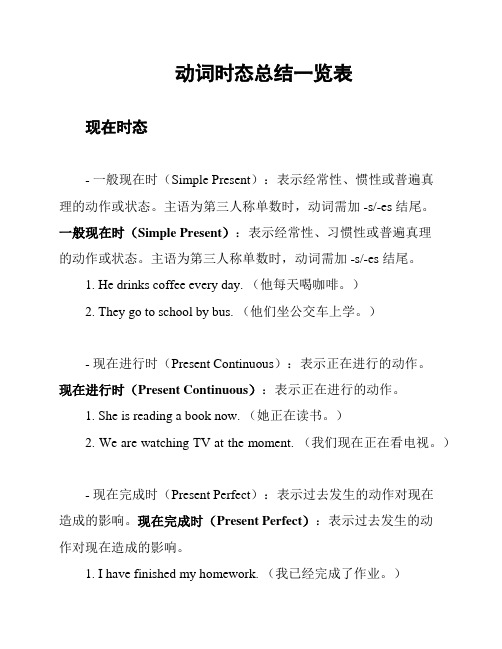
动词时态总结一览表现在时态- 一般现在时(Simple Present):表示经常性、惯性或普遍真理的动作或状态。
主语为第三人称单数时,动词需加 -s/-es 结尾。
一般现在时(Simple Present):表示经常性、习惯性或普遍真理的动作或状态。
主语为第三人称单数时,动词需加 -s/-es 结尾。
1. He drinks coffee every day. (他每天喝咖啡。
)2. They go to school by bus. (他们坐公交车上学。
)- 现在进行时(Present Continuous):表示正在进行的动作。
现在进行时(Present Continuous):表示正在进行的动作。
1. She is reading a book now. (她正在读书。
)2. We are watching TV at the moment. (我们现在正在看电视。
)- 现在完成时(Present Perfect):表示过去发生的动作对现在造成的影响。
现在完成时(Present Perfect):表示过去发生的动作对现在造成的影响。
1. I have finished my homework. (我已经完成了作业。
)2. They have lived here for two years. (他们在这里住了两年了。
)- 现在完成进行时(Present Perfect Continuous):表示动作从过去一直延续到现在。
现在完成进行时(Present Perfect Continuous):表示动作从过去一直延续到现在。
1. They have been playing basketball for two hours. (他们已经打了两个小时的篮球了。
)2. I have been studying English for five years. (我已经研究英语五年了。
)过去时态- 一般过去时(Simple Past):表示过去某个时间发生的动作或状态。
英语时态语态总结表格

英语时态语态总结表格一、时态总结。
时态名称构成用法例句。
一般现在时主语+动词原形/第三人称单数动词+s/es 表示经常性或习惯性动作,客观真理等 He goes to school by bus every day.一般过去时主语+动词过去式表示过去某个时间发生的动作或状态 Theyvisited their grandparents last Sunday.一般将来时主语+will/shall+动词原形表示将来某个时间要发生的动作或状态We will have a meeting tomorrow.现在进行时主语+be+动词-ing 表示现在正在进行的动作 He is playing football now.过去进行时主语+was/were+动词-ing 表示过去某个时间正在进行的动作 They were watching TV at 8 o'clock last night.将来进行时主语+will be/shall be+动词-ing 表示将来某个时间正在进行的动作We will be having dinner at 7 o'clock tomorrow.现在完成时主语+have/has+动词过去分词表示过去某个时间开始,一直持续到现在的动作或状态 He has lived in this city for 10 years.过去完成时主语+had+动词过去分词表示过去某个时间之前已经发生的动作或状态 They had finished their homework before 9 o'clock yesterday.将来完成时主语+will have/shall have+动词过去分词表示将来某个时间之前已经发生的动作或状态 We will have graduated from college by next year.二、语态总结。
语态名称构成用法例句。
初中英语八种时态归纳总结表格版
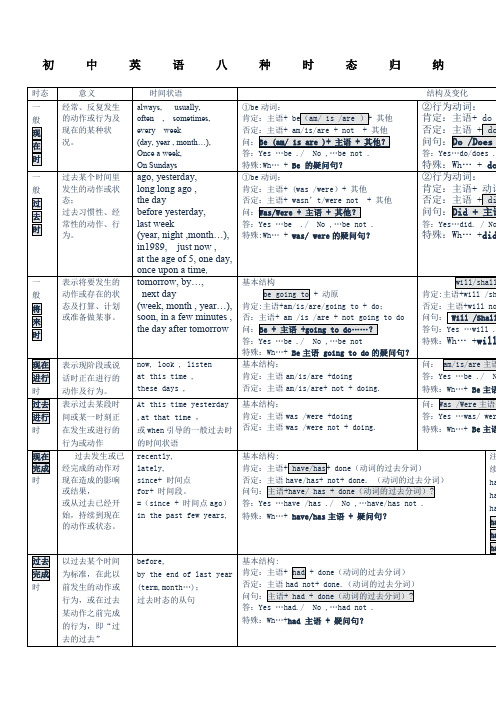
②would +do . 肯定:主语+ would 否定:主语+ woul 问句:Would 主语 答句:Yes …woul
特殊:Wh… +wou
The next day (morning,year…), the following month (week…)
基本结构: 肯定:主语+ was/were going to + do; 否:主语+ was/were+ not going to do 问:Be + 主语 +going to do……? 答:Yes …be ./ No ,…be not 特殊:Wh…+ Be 主语 going to do 的疑问句?
结构及变化
②行为动词: 肯定:主语+ do( 否定:主语 + do 问句:Do /Does
答:Yes…do/does .
特殊:Wh… + do ②行为动词: 肯定:主语+ 动词 否定:主语 + di 问句:Did + 主语
答:Yes…did. / No
特殊:Wh… +did
will/shall 肯定:主语+will /sh 否定:主语+will no 问句: Will /Shall 答句:Yes …will .
特殊:Wh… +will
问: am/is/are 主语 答:Yes …be ./ N 特殊:Wh…+ Be 主语
At th 或 when 引导的一般过去时 的时间状语
基本结构: 肯定:主语 was /were +doing 否定:主语 was /were not + doing.
英语时态和语态变化表
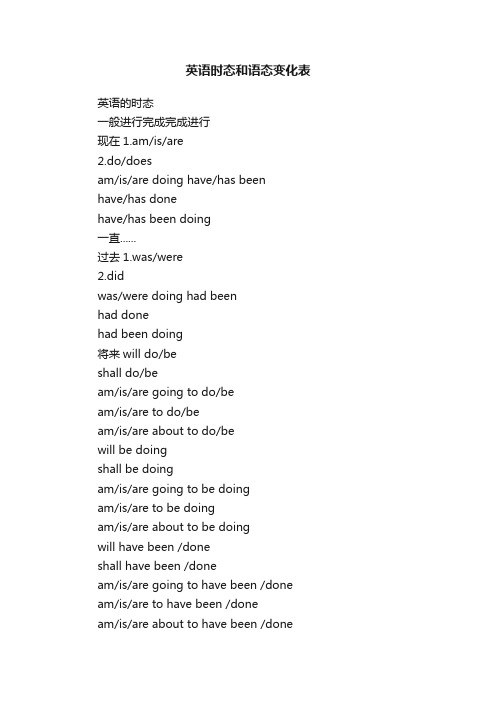
英语时态和语态变化表英语的时态一般进行完成完成进行现在1.am/is/are2.do/doesam/is/are doing have/has beenhave/has donehave/has been doing一直......过去1.was/were2.didwas/were doing had beenhad donehad been doing将来will do/beshall do/beam/is/are going to do/beam/is/are to do/beam/is/are about to do/bewill be doingshall be doingam/is/are going to be doingam/is/are to be doingam/is/are about to be doingwill have been /doneshall have been /doneam/is/are going to have been /done am/is/are to have been /doneam/is/are about to have been /donewill have been doingshall have been doingam/is/are going to have been doingam/is/are to have been doingam/is/are about to have been doing过去将来would do/beshould do/bewas/were going to do/bewas/were to do/bewas/were about to do/bewould be doingshould be doingwas/were going to be doingwas/were to be doingwas/were about to be doingwould have been /doneshould have been /donewas/were going to have been /donewas/were to have been /donewas/were about to have been /donewould have been doingshould have been doingwas/were going to have been doingwas/were to have been doingwas/were about to have been doing英语的被动语态一般进行完成完成进行现在am/is/are done am/is/are being done have/has been done have/has been being done一直......过去was/were done was/were being done had been done had been being done将来will be doneshall be doneam/is/are going to be doneam/is/are to be doneam/is/are about to be donewill be being doneshall be being doneam/is/are going to be being doneam/is/are to be being doneam/is/are about to be being donewill have been doneshall have been doneam/is/are going to have been doneam/is/are to have been doneam/is/are about to have been donewill have been being doneshall have been being doneam/is/are going to have been being doneam/is/are to have been being doneam/is/are about to have been being done过去将来would be doneshould be donewas/were going to be donewas/were to be donewas/were about to be donewould be being doneshould be being donewas/were going to be being donewas/were to be being donewas/were about to be being done would have been doneshould have been donewas/were going to have been donewas/were to have been donewas/were about to have been done would have been being doneshould have been being donewas/were going to have been being done was/were to have been being donewas/were about to have been being done。
动词时态语态一览表

现在完成进 行时
h动作一直持续到现在且还在进行
We have bee n wait ing here for half an hour, but Tom has n'ttur ned up.
2.动作的重复,强调长时间进行
I'm very tired. I have been preparing the report the whole morni ng.
一般将来时
will/shall do…be going to do…be to do…be about to do…
will/shall be done
1.现在说话是正在进仃的动作2.计划准备要做的事
3.现阶段正在做,但此时此刻不一定(these days/months/this year…)4.短暂性动词的进行时表将 来(come/go/start/begin/arrive/leave/die/buy…)注:系动词/感官动词/表拥有的/测量的/结果的/心理 活动的动词无进时
4.正要/刚要做…”(不与时间连用)
将来进行时
will/shall be doing
将来某一时间正在发生的动作What will you do this
time tomorrow?
将来完成时
will/shall have done
will/shall have bee n
done
截止到将来某一时间要元成的动作By the end of next
1.客观上势必发生(倾向性)/临时的打算---Tom, you didn'turn off the light. ---Oh, I forgot. I'ldo it .
